Ancient Rome was a society overwhelmingly dominated by men, where political power was officially reserved for male citizens. Roman women were legally excluded from voting or holding office, which might suggest their political influence was negligible. Yet, the reality reveals a more complex picture. Women in Rome, especially those from elite families, played subtle but significant roles in shaping imperial politics through indirect channels.
Understanding the role of Roman women in shaping imperial politics requires looking beyond formal titles and offices. Their power often came from personal relationships, religious authority, and family networks. By influencing emperors, senators, and key decision-makers behind the scenes, women impacted policy and succession in ways that official records frequently obscure.
Recognizing this indirect female influence is crucial to fully grasping the dynamics of ancient Roman political life and the hidden forces that shaped the empire’s governance.
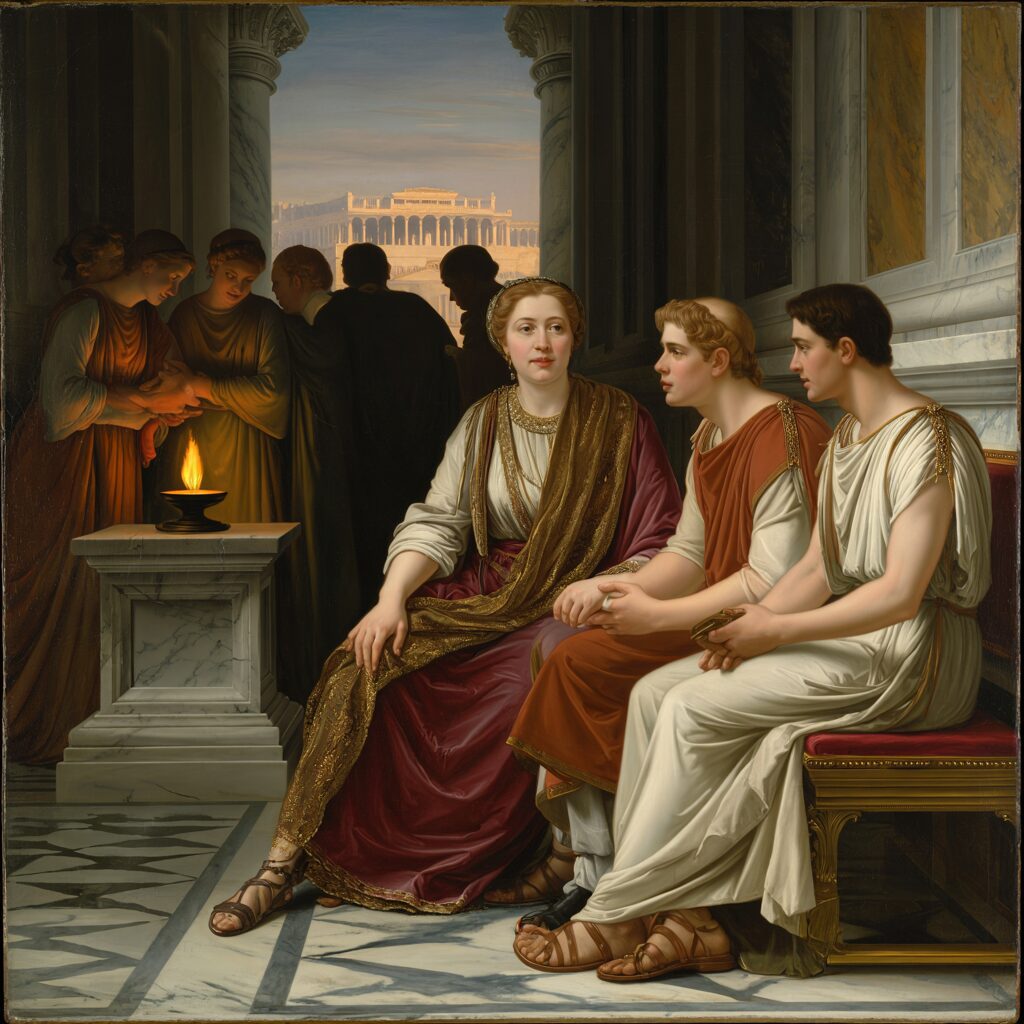
The Societal Context: Women’s Status in Ancient Rome
Roman society had strict gender roles that greatly limited women’s political rights. Women were not allowed to vote or hold public office, and their political opinions were not recognized in official institutions. This reflected a larger social structure that valued male authority above all.
The Influence of Ordinary and Elite Women
The influence of women in ancient Rome varied depending on their social status:
- Ordinary women faced significant limitations, with little access to education or wealth, which restricted their roles mainly to household duties.
- Elite women had a more complex reality. Although they were excluded from official power, they still had influence through family connections, managing wealth, and receiving education. Being part of the elite class gave them opportunities to engage in politics indirectly.
Family as the Key Player
The family was the primary place where women could get involved in politics. Education for elite girls often included subjects like rhetoric, literature, and philosophy, which prepared them to join intellectual and social circles that were important for influencing their male relatives who participated in politics.
The Role of Roman Women’s Political Agency
Roman women’s ability to participate in politics relied heavily on their skills in using family relationships and social status rather than having formal power.
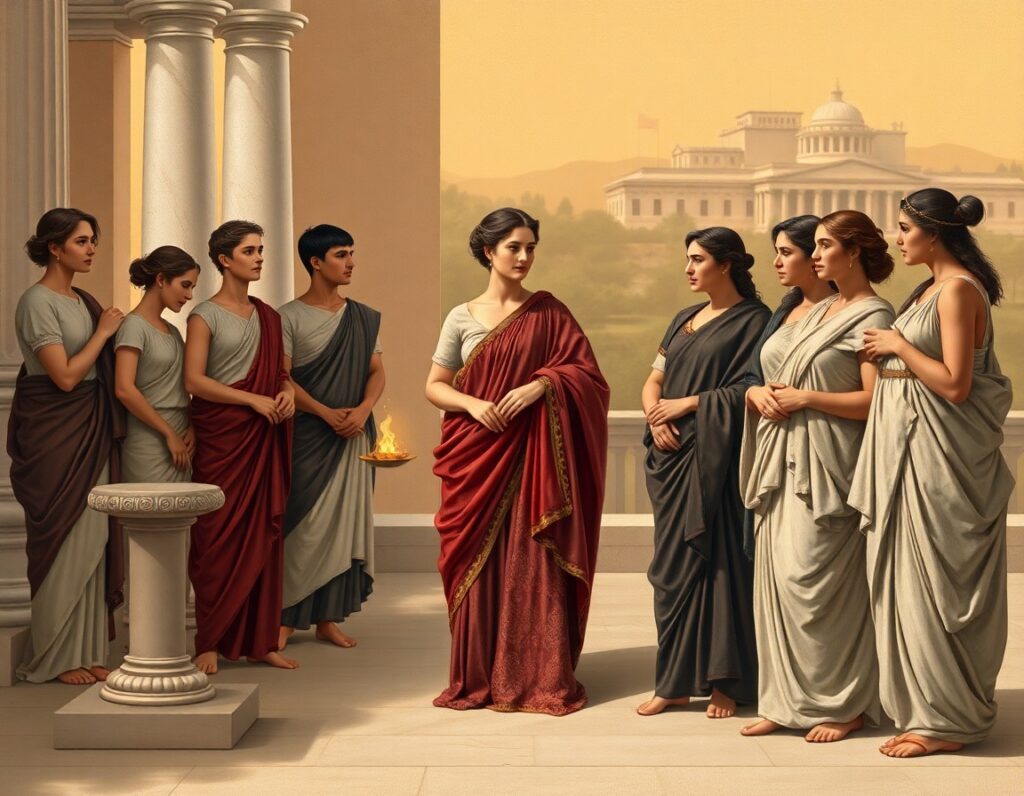
Religious Authority as a Channel for Political Influence
The Vestal Virgins held a unique and influential role in Roman society, combining religious power with political influence. As priestesses devoted to the goddess Vesta, their main responsibility was to tend to the sacred fire of Rome‘s hearth—a symbol believed crucial for the city’s survival and success. This duty placed them at the center of both Rome’s spiritual and civic affairs.
Key aspects of Vestal Virgins’ influence include:
- Sacred Status: Their vow of chastity and lifelong service granted them privileges unavailable to other women, such as legal independence from male guardianship.
- Political Interventions: Vestals could intervene in legal and political matters, sometimes offering protection or clemency to condemned individuals, demonstrating their indirect but tangible sway over public affairs.
- Symbolic Power: By embodying Rome’s religious purity, they reinforced the stability of the state, making their favor critical during times of political uncertainty or transition.
This combination of spiritual obligation and political impact set Vestal Virgins apart as exceptional female figures in a male-dominated society. Their religious authority often translated into subtle yet significant political influence, offering women an extraordinary opportunity to participate in imperial politics beyond conventional family or marital connections.
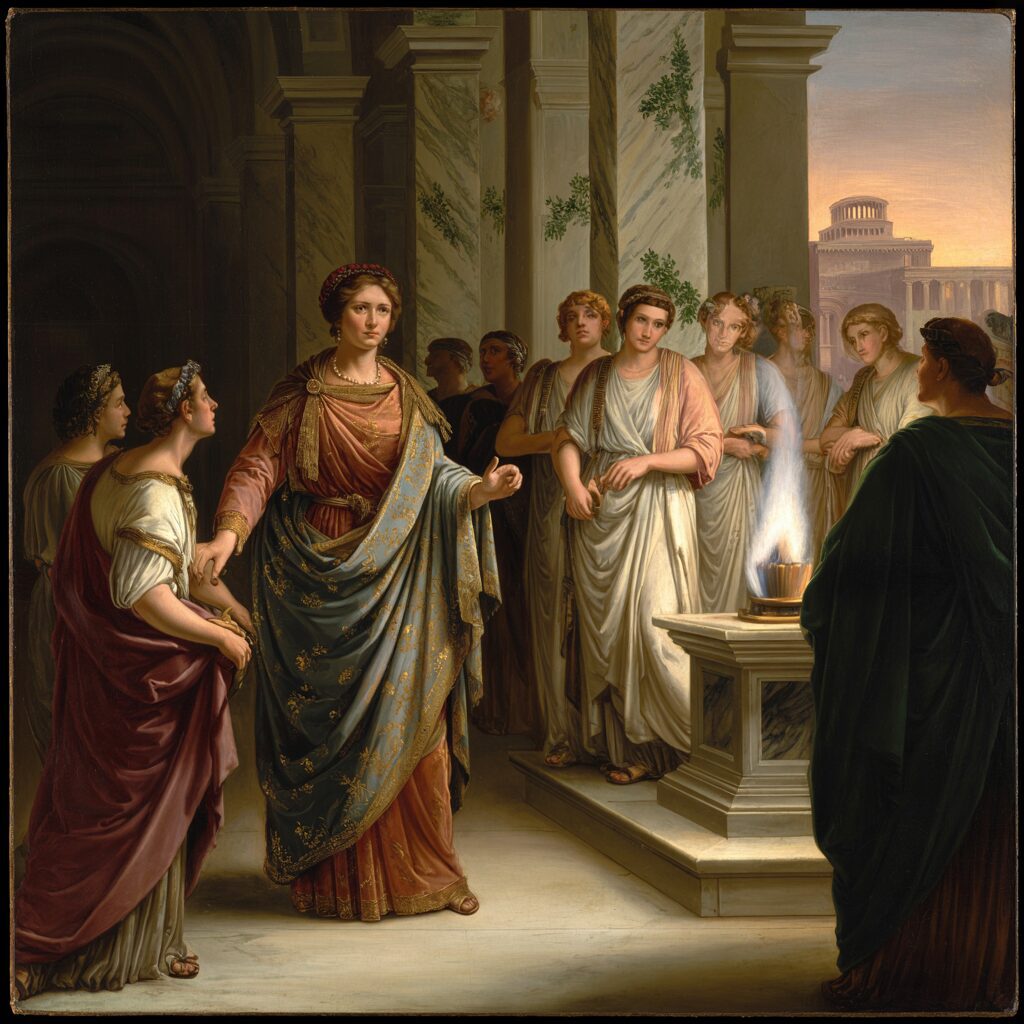
Elite Women: Navigating Power through Marriage and Family Networks
Elite Roman women found political influence by leveraging family connections and marriage alliances. Cornelia, the mother of the Gracchi brothers, stands out as a prime example of how maternal advocacy shaped political reform efforts. Known for her intelligence and dedication, Cornelia used her position within the elite class to support and legitimize her sons’ populist agenda.
- Cornelia’s role extended beyond motherhood; she was an active participant in their political lives, advising and encouraging Tiberius and Gaius Gracchus in their efforts to redistribute land and challenge the Senate’s dominance.
- Her reputation as a learned woman enhanced her authority, making her a symbol of virtue and political wisdom among Roman elites.
- Cornelia’s ability to navigate patriarchal restrictions shows how The Role of Roman Women in Shaping Imperial Politics often relied on indirect but powerful forms of engagement through family.
By maintaining strong familial networks and embodying intellectual authority, women like Cornelia influenced legislation and public opinion without holding formal office. Their impact reveals a nuanced dimension of Roman politics where marriage and kinship became vital channels for female agency.
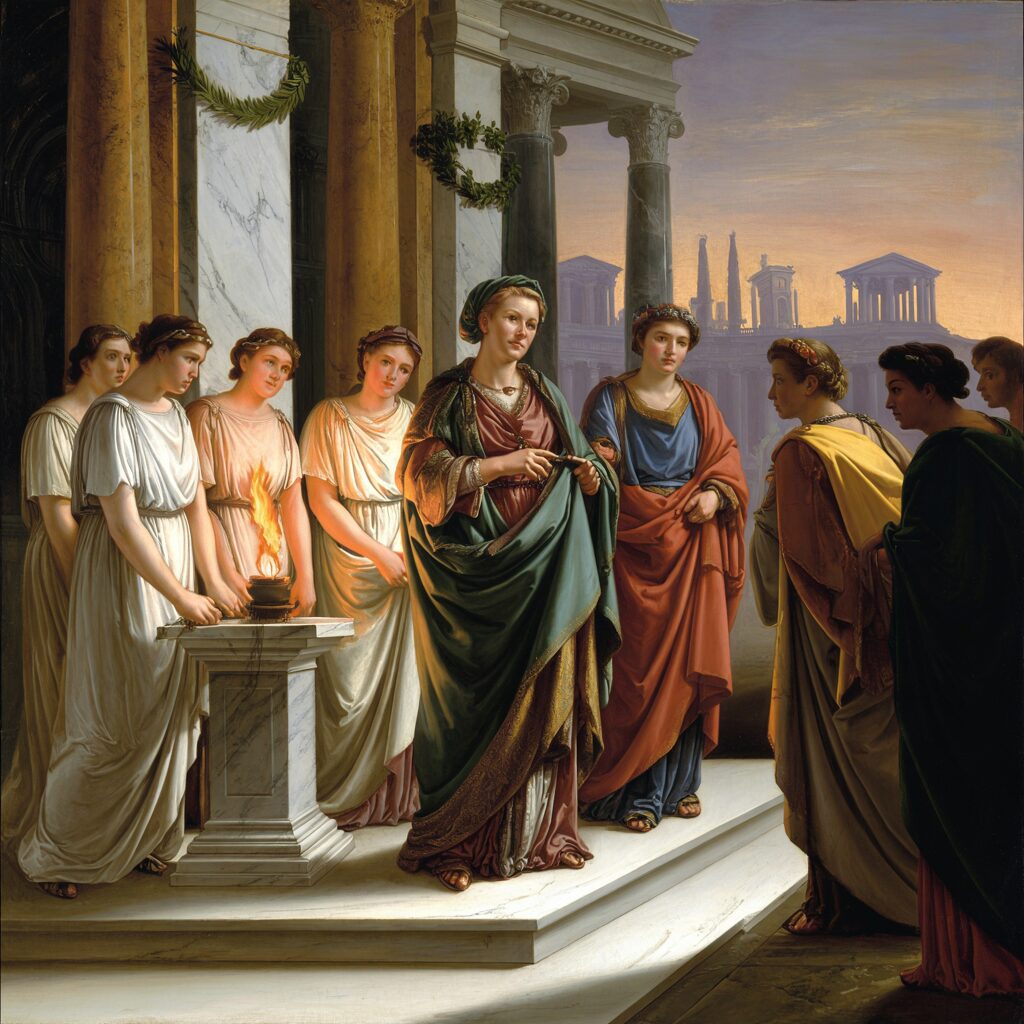
Imperial Women: Balancing Public Status and Political Agency
Faustina the Younger, Marcus Aurelius
This section will explore Faustina the Younger’s role alongside her husband, Marcus Aurelius, including her involvement in military campaigns and posthumous honors that reflected their political importance.
Livia Drusilla and Agrippina the Younger: Case Studies in Female Ambition and Influence
Livia Drusilla remains one of the most influential women in Roman imperial history. As the wife of Augustus, she wielded remarkable power behind the scenes, shaping the course of imperial succession with strategic precision. Livia’s influence extended beyond mere companionship; she was deeply involved in political maneuvering that secured her son Tiberius’ eventual rise to emperor.
Livia Drusilla’s Influence
- Strategic Role in Succession: Livia’s guidance helped Augustus navigate the complex issue of succession after the death of his intended heir, Marcellus. She is believed to have advocated for Tiberius, positioning him as Augustus’ successor despite earlier plans favoring others such as Agrippa’s sons.
- Historical Accusations: Ancient historians like Tacitus and Suetonius portray Livia with suspicion, accusing her of orchestrating poisonings and political eliminations to clear the path for her family. These accounts reflect the anxieties about female ambition in a patriarchal society but also highlight how women like Livia could exercise power in subtle yet impactful ways.
- Complex Female Power Dynamics: Livia’s story reveals a dual reality — she was respected for her intelligence and loyalty yet feared for her influence. This complexity underscores how Roman women navigated their roles within constraints, employing indirect control to affect imperial politics.
Agrippina the Younger exemplifies another facet of female ambition in Rome, marked by boldness and political acumen. She used marriage alliances not only as social contracts but as deliberate strategies to enhance her status and influence.
Agrippina the Younger’s Influence
- Marriage as Political Strategy: Agrippina married Emperor Claudius, her uncle, solidifying her position within the Julio-Claudian dynasty. This union elevated her political weight and allowed her to promote her son Nero as heir over Claudius’ biological son.
- Regency during Nero’s Early Reign: When Nero became emperor at a young age, Agrippina acted as regent, effectively controlling imperial affairs. Her regency demonstrates how elite women could exert direct political power when circumstances allowed.
- Political Intrigues and Downfall: Agrippina’s ambition attracted enemies at court. Rumors circulated about her involvement in poisoning Claudius to expedite Nero’s accession. Over time, tensions between mother and son escalated until Nero had Agrippina executed—an end illustrating both the perilous nature of female power and its limits within imperial politics.
Both Livia Drusilla and Agrippina the Younger illustrate how Roman women could leverage family ties, marriage alliances, and court politics to assert influence. Their lives offer insight into the delicate balance between ambition and survival faced by women operating in a male-dominated political arena.
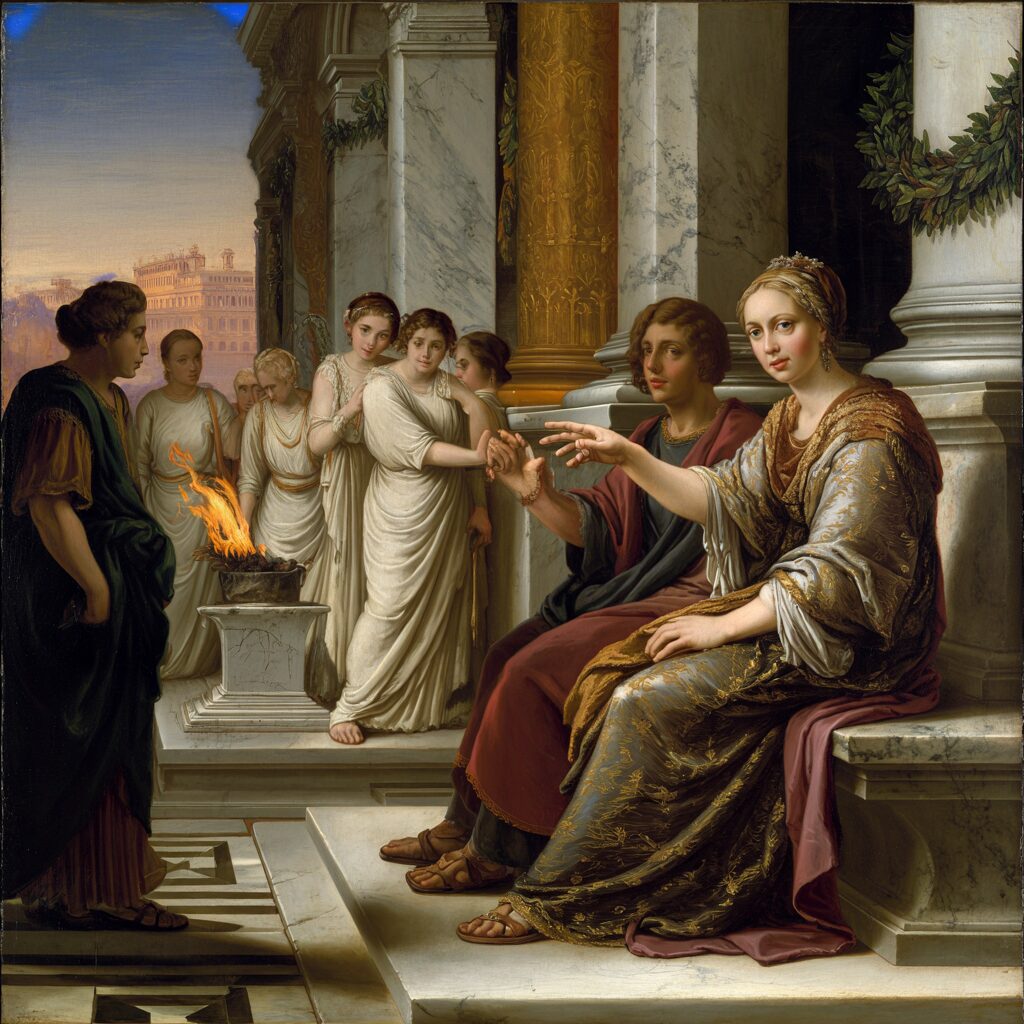
Challenges Faced by Influential Women in a Patriarchal Society
In ancient Rome, the rise of powerful women was met with significant societal resistance. Despite their contributions to politics and society, many influential women faced suspicion and hostility from a male-dominated culture that struggled to accept their authority.
One notable example is the role of women in shaping imperial politics. While women were often excluded from formal political power, they found ways to exert influence behind the scenes. Figures like Livia Drusilla, the wife of Emperor Augustus, and Agrippina the Younger, the mother of Emperor Nero, played crucial roles in shaping the course of Roman history through their relationships with powerful men.
However, their actions were not without controversy. Livia was often portrayed as a manipulative figure who used her influence to secure her son’s position as emperor, while Agrippina faced accusations of overreach and ambition. These portrayals reflect the deep-seated gender bias that existed in Roman society, where women in power were often viewed with suspicion and hostility.
Despite these challenges, many women continued to navigate the patriarchal structures of their time and carve out spaces for themselves in politics. Their stories serve as a testament to the resilience and resourcefulness of women throughout history, even in the face of systemic barriers. This resilience is further highlighted by the experiences of ancient Roman women and girls, who despite facing numerous societal challenges, managed to make significant strides in various fields.
Re-evaluating the Legacy of Roman Women in Imperial Politics
The legacy of Roman women reveals a complex web of influence that operated through indirect means rather than direct power. Their ability to engage in politics was often limited, but they found ways to exert influence through marriage, family connections, religious responsibilities, and personal advice. To fully appreciate The Role of Roman Women in Shaping Imperial Politics, we must look beyond conventional stories that overlook their contributions.
Key points to consider:
- Indirect Influence: Women like Livia and Agrippina shaped succession and policy by leveraging relationships rather than holding formal office.
- Religious and Social Authority: Vestal Virgins and elite women wielded unique power through sacred duties and family networks.
- Resistance and Recognition: Despite facing suspicion and hostility, these women left enduring marks on Rome’s political landscape.
Understanding the intricate roles played by Roman women enhances our comprehension of ancient Rome’s political structure. It challenges the male-centered perspective while acknowledging the subtle yet significant impact these women had on governing the empire.

